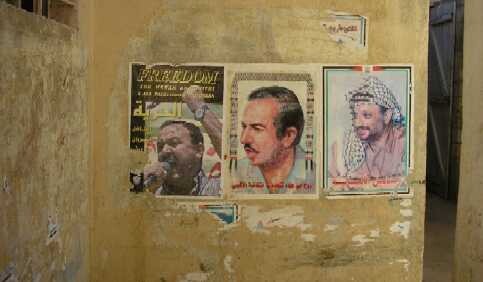Al Jazeera 13 March 2005

Posters with Marwan Barghouti (L), who has been imprisoned by Israel since April 2002, Abu Jihad, who was assassinated by Israel in Tunis in 1988, and Yasser Arafat (R) on a wall in a Palestinian refugee camp in Lebanon. (Arjan El Fassed)
A power struggle is taking place within the Fatah movement, the organisational and political backbone of the Palestinian Authority.
The main contention is between the movement’s old guard, eager to retain power, and younger leaders at the intermediate levels, protesting against their marginalisation and what they call “rampant despotism and authoritarianism” by the senior leadership.
The latest expression of the simmering discontent within the movement’s rank and file took place on Wednesday when about 250 Fatah members in the Gaza Strip decided to quit, citing chaos and “personalisation” of leadership.
Earlier, as many as 18 prominent regional Fatah leaders in the West Bank, including several legislators, resigned en masse from Fatah.
The leaders, who included such people as Ahmad Ghunaim, Muhammad Hurani, Husayn al-Shaikh, Qaddura Faris, Jamal Shubaki and Hatim Abd al-Qadir warned that Fatah would suffer a resounding defeat in the forthcoming legislative election, scheduled for 25 July, unless radical organisational reforms within the movement were introduced sooner rather than later.
Losing popularity
In a press interview earlier this week, Ghunaim argued that Fatah was losing to Hamas in popularity due to “mistakes and blunders” made by the movement’s leadership, particularly the Fatah executive committee, controlled mainly by “outsiders” who returned from abroad after the creation of the self-rule authority in 1993.
Ghunaim and his colleagues, who are allied with imprisoned Fatah leader Marwan al-Barghuthi, stressed that their mass resignation was not a bluff, as their opponents charged earlier.
He said the old guard would bear full responsibility for the receding status and stature as well as possible disintegration of Fatah.
Palestinian columnist and political analyst Hani al-Masri says the leaders who resigned “feel betrayed, marginalisd and even cheated by the senior Fatah leadership.
“And their exclusion from the recently formed government seemed to be the straw that broke the camel’s back. Hence, they are trying to save their political future.”
Speaking to Aljazeera.net, al-Masri described the resignations as a “typical intra-factional struggle within a heterogeneous movement that was only kept intact throughout many years by Yasir Arafat.
“But Arafat is dead and every faction or group or even subgroup is now looking after its own interests”.
Image problem
It is too early to say for sure whether the resignations will make an impact on the movement or, in the immediate term, succeed in unseating the symbols of the old guard such as Prime Minister Ahmad Quraya and his allies.
If truth be told, the al-Barghuthi camp, to which most of those who have resigned belong or are associated with, is not without its own image problem, especially since the election of Mahmud Abbas, also known as Abu Mazin, as president of the Palestinian Authority (PA) on 9 January.
For one thing, the group has yet to live down the flip-flops of al-Barghuthi in the run-up to the PA presidential election.
Al-Barghuthi twice declared his own candidacy for the presidency of the PA, only to withdraw each time, thus creating confusion among the public with regard to his stand.
For another, some of al-Barghuthi’s allies, like legislative council member Faris, embraced the politically controversial Geneva initiative two years ago.
The private peace initiative effectively scrapped the right of return for millions of Palestinian refugees expelled or displaced by Israel in 1948, prompting angry reactions from many Palestinians, especially the refugees.
Palestinian analysts believe these two factors, together with the al-Barghuthi allies’ somewhat contradictory approach to the issue of armed struggle, might hurt their prospects should they decide to contest the parliamentary elections as a reformed Fatah group or independent list.
‘Anachronistic ways’
One of the group’s leading lights, Hatim Abd al-Qadir, has intimated that he and his colleagues are only trying to “save Fatah from itself”.
“We are trying to save Fatah by introducing and effecting democratic reforms from bottom to top, in order to survive and compete, Fatah will have to cast off its anachronistic ways.”
However, it is abundantly clear that the old guard will not simply give in to the demands of the younger generation within Fatah, much less cede authority and influence.
For instance, on 7 March, as many as 140 prominent Fatah members from all over the West Bank circulated a memorandum, castigating the rebels, accusing them of “creating division”, “compromising Fatah’s unity” and “weakening” the movement.
The petitioners also argued that if Fatah was to lose the municipal and parliamentary elections, it would be because of “this sort of factional and diversionary adventures”.
Abbas has so far refused to take sides, fearing further polarisation. But it is an open secret that he himself has plenty of differences with Quraya, reminiscent of his relationship with Arafat in 2003 shortly before he handed in his government’s resignation.
Hearts and minds
Some observers feel Fatah leaders, fearing a poor performance, will recommend that the legislative polls be postponed by six months or so to give the organisation sufficient time to improve its political standing. But they add that it is highly unlikely that Abbas, who is Fatah’s paramount leader and Arafat’s successor, will agree to such a demand.
For, if nothing else, any postponement of the election will damage Abbas’ credibility as president and create a serious rift between the PA and powerful Palestinian factions such as Hamas, Fatah’s main rival for the hearts and minds of Palestinians.
As for his differences with Quraya, presumably these are being kept under wraps, or at least behind closed doors, pending the July elections, when a new legislative council will be elected and a new government formed.
Khalid Amayreh is a journalist based in the occupied West Bank. This article was originally published by aljazeera.net and reprinted on EI with permission.





